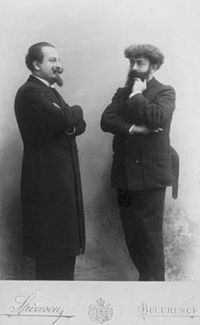- Joséphin Péladan
-
 Photograph of Péladan (right) and the Romanian writer Alexandru Bogdan-Piteşti, during a visit to Bucharest
Photograph of Péladan (right) and the Romanian writer Alexandru Bogdan-Piteşti, during a visit to Bucharest
Joséphin Péladan (28 March 1858, Lyon – 27 June 1918) was a French novelist and Martinist. His father was a journalist who had written on prophecies, and professed a philosophic-occult Catholicism.
Contents
Biography
His eldest brother Adrien studied alchemy and occultism as well. In 1882 he came to Paris where Arsene Houssaye gave him a job on his artistic review, L'Artiste. In 1884 he published his first novel, Le Vice Supreme, which recommended the salvation of man through occult magick of the ancient east.[1]
He claimed that a Babylonian King left the title of "Sâr" to his family. Péladans Le vice suprème was interwoven with Rosicrucian and occult themes. After reading Péladan's novel, the French poet Stanislas de Guaita became interested in occultism. In Paris, De Guaita and Péladan became acquainted, and in 1884, the two decided to try to rebuild the Rosicrucian Brotherhood.
De Guaita and Péladan recruited Gérard Encausse to help rebuild the brotherhood. Encausse, who went by the pseudonym “Papus”, was a Spanish-born French physician and occultist who had written books on magic, Kabbalah and the Tarot. In 1888, De Guaita founded the Cabalistic Order of the Rosicrucian. The Rosicrucian Order is a legendary and secretive Order that was first publicly documented in the early 17th century.
Guaita's Rosicrucian Order provided training in the Kabbalah, an esoteric form of Jewish mysticism, which attempts to reveal hidden mystical insights in the Hebrew Bible and divine nature. The order also conducted examinations and provided university degrees on Kabbalah topics. De Guaita had a large private library of books on metaphysical issues, magic, and the "hidden sciences." He was nicknamed the "Prince of the Rosicrucian" by his contemporaries for his broad learning on Rosicrucian issues.
By the 1890, De Guaita, Papus, and Péladan’s collaboration became increasingly strained by disagreements over strategy and doctrines. De Guaita and Papus lost the support of Péladan, who left to start a competing order. In June 1890, Péladan left the Martinist Order and created a Catholic Order of the Rose and the Cross. Péladan was the leader of the new order, and he took the titles of "Imperator" and "Super Magician".
Publications
- Le Vice suprême, novel, 1884
- Curieuse, 1885
- Femmes honnêtes!, 1885
- L'Initiation sentimentale, 1887
- Istar, 1888
- A coeur perdu, 1888
- Coeur en peine, 1890
- Le prochain conclave; instructions aux cardinaux, 1890
- Comment on devient mage, 1891
- L'androgyne, 1891
- La gynandre, 1891
- La Typhonia, 1892
- Le panthée, 1892
- La queste du Graal - proses lyriques de l'éthopée - la décadence latine; published "au salon de la Rose+Croix" (1892)
- Le theatre complet de Wagner les XI opéras scène par scène avec notes biographiques et critiques, 1894
- L'art idéaliste et mystique: doctrine de lordre et du salon annuel des Rose + Croix , 1894
- Babylone, tragedy, 1895
- Mélusine, 1895
- Le dernier Bourbon, tragedy, 1895
- Le livre du sceptre: politics, 1895
- La Prométhéide : trilogie d'Eschyle en quatre tableaux, 1895
- Le Prince de Byzance, tragedy, 1896
- Œdipe et le Sphinx, tragedy in prose, 1903
- Sémiramis, tragédie en prose, 1904
- La Dernière Leçon de Léonard de Vinci, essay, 1904
- La Clé de Rabelais, 1905
- De Parsifal à don Quichotte, essay, 1906
- La Doctrine de Dante, 1908
- La philosophie de Léonard de Vinci d'après ses manuscrits, essay, 1910 (rééd. Stalker, 2007)
- De l'Androgyne. Théorie plastique, essay 1910
See also
- Stanislas de Guaita
- Joseph-Antoine Boullan
- Henri Antoine Jules-Bois
- Joris K. Huysmans
References
- ^ Rudorff, Raymond, The Belle Epoque - Paris in the Nineties, Saturday Review Press, New York, 1972. (pp. 185-195).
Categories:- 1858 births
- 1918 deaths
- People from Lyon
- French novelists
- French occultists
- Rosicrucians
Wikimedia Foundation. 2010.
